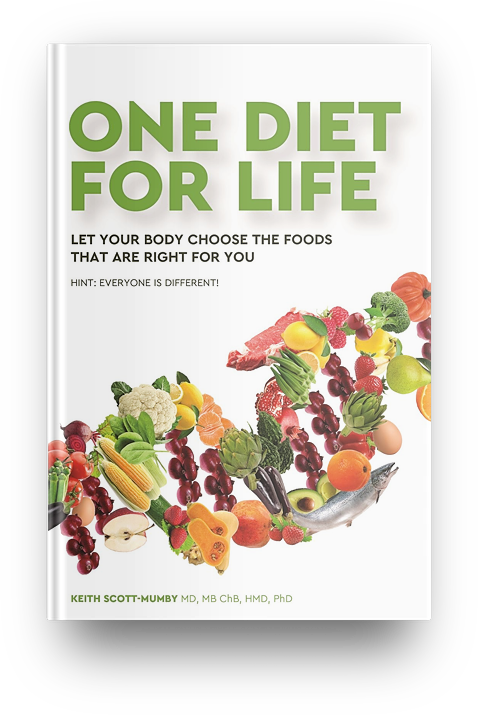There is plenty of science now about fasting. As well as published papers, there are numerous anecdotal stories from individuals, and “advice” (probably hyped beyond their knowledge and understanding) from wannabe experts on numerous health websites. It’s quite the thing these days!
But I have one question (remember I’ve been teaching fasting as a health tool a lot longer than the current fashion—since 1983 in fact): the question is WHY DON’T THEY FOLLOW UP WITH TRIAL AND ERROR EATING? I mean, Duh!
If giving up food has such a health benefits—for some even their whole problem clears up—why not identify WHICH FOODS ARE THE TROUBLEMAKERS?
For many decades, in many of my books, and on countless radio and TV interviews, I (often jokingly) say, “One test for food allergy is to give up eating. If your problem goes away, it’s a food allergy.” I mean, how logical is that?
Usually I suggest that fasting is a bit steep for many, so we compromise with an elimination or exclusion diet—giving up the most likely foods and seeing if that works. But then we have to follow up with challenge testing. Eat the banned foods again, one at a time, done carefully (there are rules) and see which one(s) bring back the symptoms. Those are the ones to avoid!
It’s all in my book ONE DIET FOR LIFE. It’s very rare to see this simple, basic routine described on Mercola, Natural Health News (Health Ranger) and GreenMedInfo; in fact I never have. But I’ve cured 10,000s of patients; had them up out of wheelchairs; got an epileptic man his driving license back; solved lifelong migraines; asthma, eczema, colitis, Crohn’s, urticaria, got infertile women pregnant (oh pur-lease, by their husbands!), irritable bowel, arthritis, schizophrenia (yes!), depression, ADHD and hyperactivity, learning disorders, violent attacks, rage, even tinnitus… the list goes on and on.
It’s very rare to see this simple, basic routine described on Mercola, Natural Health News (Health Ranger) and GreenMedInfo; in fact I never have. But I’ve cured 10,000s of patients; had them up out of wheelchairs; got an epileptic man his driving license back; solved lifelong migraines; asthma, eczema, colitis, Crohn’s, urticaria, got infertile women pregnant (oh pur-lease, by their husbands!), irritable bowel, arthritis, schizophrenia (yes!), depression, ADHD and hyperactivity, learning disorders, violent attacks, rage, even tinnitus… the list goes on and on.
So maybe you can see why I’m baffled by a bit of daft science that came into my INBOX today. An article announced that “Cambridge scientists may have discovered a new way in which fasting helps reduce inflammation – a potentially damaging side-effect of the body’s immune system that underlies a number of chronic diseases.”
In research published in Cell Reports, the team describes how fasting raises levels of a chemical in the blood known as arachidonic acid, which inhibits inflammation. The researchers say it may also help explain some of the beneficial effects of drugs such as aspirin.¹
Yes, well I would say that also explains the health benefits of things like omega-3 fatty acids, curcumin, colchicine, epigallocatechin-3-gallate (EGCG) and quercetin. And they don’t have anywhere near the same dangerous side-effects as aspirin but they are highly effective anti-inflammatories.
But they are seriously wrong on another account: omega-6 fatty acids, like arachidonic acid, are serious CAUSES of inflammation, not mediators. More exactly the ratio of omega-3s to omega-6s is to blame. It now stands at 20:1! Traditional diets, omega-6s were low (around 2%) and the ratio was nearer 1:1.²
Arachidonic acid leads to pathways prostaglandins, prostanoids and leukotrienes, some of which are also important inflammatory mediators. They are probably of particular importance in leucocyte-mediated aspects of chronic inflammation.³
I just don’t understand this muddled article!
Never mind, to go back to my main thrust, researchers like this never seem interested in seeing what foods? Just what chemical pathways? I’m baffled. I can only surmise that it’s because they think we are all identical (average) and all triggers are the same.
That’s just not true. As I have written thousands of times, nobody is average! There isn’t one single average human being walking on this planet. So rather than fuss about HOW it does it, I care about WHAT does it?
The Inflammasome
I practiced medicine for 40 years without knowing this word. Hah! Well apparently, although inflammation is our body’s natural response to injury or infection, this process can be triggered by other mechanisms, including by the so-called ‘inflammasome’, which acts like an alarm within our body’s cells, triggering inflammation to help protect our body when it senses damage.
But the inflammasome can trigger inflammation in unintentional ways – one of its functions is to destroy unwanted cells, which can result in the release of the cell’s contents into the body, where they trigger inflammation.
Professor Clare Bryant from the Department of Medicine at the University of Cambridge (UK) said: “We’re very interested in trying to understand the causes of chronic inflammation in the context of many human diseases, and in particular the role of the inflammasome.
“What’s become apparent over recent years is that one inflammasome in particular – the NLRP3 inflammasome – is very important in a number of major diseases such as obesity and atherosclerosis, but also in diseases like Alzheimer’s and Parkinson’s disease, many of the diseases of older age people, particularly in the Western world.”
Dear Dr. Clare, the inflammasome is a mechanism, not WHAT triggers inflammation. We need to dig deep into causes, not mechanisms. Still you are on the hunt for drugs I suppose, chemicals which will block the inflammasome, even though it’s an absolutely crucial self-defence mechanism?
Back To The Study
A team led by Professor Bryant and colleagues at the University of Cambridge and National Institute for Health in the USA studied blood samples from a group of 21 volunteers, who ate a 500kcal meal then fasted for 24 hours before consuming a second 500kcal meal.
The team found that restricting calorie intake increased levels of arachidonic acid. As soon as individuals ate a meal again, levels of arachidonic acid dropped. As I said, whatever led to reduced inflammation, it was not arachidonic acid. Even the team were surprised, as arachidonic acid was thought to be linked with increased levels of inflammation, not decreased.
Just to remind you, association is not causation.
Professor Bryant, a Fellow of Queens’ College, Cambridge, added: “It’s too early to say whether fasting protects against diseases like Alzheimer’s and Parkinson’s disease as the effects of arachidonic acid are only short-lived, but our work adds to a growing amount of scientific literature that points to the health benefits of calorie restriction. It suggests that regular fasting over a long period could help reduce the chronic inflammation we associate with these conditions. It’s certainly an attractive idea.
“There could be a yin and yang effect going on here, whereby too much of the wrong thing is increasing your inflammasome activity and too little is decreasing it.”
I return to what I said, fasting is good. Therefore why not try and establish which foods trigger inflammation AND THEY WILL BE DIFFERENT FOR VIRTUALLY EVERY INDIVIDUAL. Wheat, dairy and coffee are mine, but they drift. I enjoyed coffee for over 35 years. Now it gets to me! Plus I had milk daily in my two coffees. So now I’ve given up coffee, I’ve gone dairy-free!
OMG look at this picture!
To Your Good Health,Prof. Keith Scott-Mumby
The Official Alternative Doctor
The research was funded by Wellcome, the Medical Research Council and the US National Heart, Lung, and Blood Institute Division of Intramural Research.
References:
- Pereira, M & Liang, J et al. Arachidonic acid inhibition of the NLRP3 inflammasome is a mechanism to explain the anti-inflammatory effects of fasting. Cell Reports; 23 Jan 2024; DOI: 10.1016/j.celrep.2024.113700
- https://mindandmatter.substack.com/p/why-are-we-getting-fatter-part-iv
- Equine Vet J. 1984 May;16(3):163-75. doi: 10.1111/j.2042-3306.1984.tb01893.x





